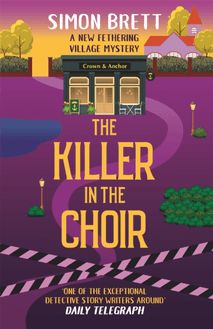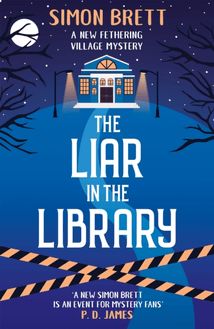Torso in the Town , livre ebook
178
pages
English
Ebooks
2019
Vous pourrez modifier la taille du texte de cet ouvrage
Obtenez un accès à la bibliothèque pour le consulter en ligne En savoir plus
Découvre YouScribe en t'inscrivant gratuitement
Découvre YouScribe en t'inscrivant gratuitement
178
pages
English
Ebooks
2019
Vous pourrez modifier la taille du texte de cet ouvrage
Obtenez un accès à la bibliothèque pour le consulter en ligne En savoir plus
Publié par
Date de parution
06 juin 2019
Nombre de lectures
0
EAN13
9781786897749
Langue
English
Publié par
Date de parution
06 juin 2019
Nombre de lectures
0
EAN13
9781786897749
Langue
English
Simon Brett worked as a producer in radio and television before taking up writing full-time. He was awarded an OBE in the 2016 New Year’s Honours ‘for services to literature’ and also was elected a Fellow of the Royal Society of Literature. In 2014 he won the CWA’s prestigious Diamond Dagger for an outstanding body of work. simonbrett.com
Also by Simon Brett
The Fethering Mysteries The Body on the Beach Death on the Downs Murder in the Museum The Hanging in the Hotel The Witness at the Wedding The Stabbing in the Stables Death Under the Dryer Blood at the Bookies The Poisoning in the Pub The Shooting in the Shop Bones Under the Beach Hut Guns in the Gallery Corpse on the Court The Strangling on the Stage The Tomb in Turkey The Killing in the Cafe The Liar in The Library
The Charles Paris Theatrical Series Dead Room Farce A Decent Interval The Cinderella Killer
The Mrs Pargeter Mysteries Mrs Pargeter’s Point of Honour Mrs Pargeter’s Principle Mrs Pargeter’s Public Relations
First published in Great Britain, the USA and Canada in 2019 by Black Thorn, an imprint of Canongate Books Ltd, 14 High Street, Edinburgh EH1 1TE
This digital edition first published in 2019 by Black Thorn, an imprint of Canongate Books
First published in 2002 by Macmillan Publishers Ltd, Pan Macmillan, 20 New Wharf Road, London N1 9RR
blackthornbooks.com
Copyright © Simon Brett, 2002
The moral right of the author has been asserted
This is a work of fiction. Names, characters, places and incidents are either the product of the author's imagination or are used fictitiously. Except where actual historical events and characters are being described for the storyline of this novel, all situations in this publication are fictitious and any resemblance to actual persons, living or dead, business establishments, events or locales is purely coincidental.
British Library Cataloguing-in-Publication Data A catalogue record for this book is available on request from the British Library
e ISBN 978 1 78689 774 9
Contents
Chapter One
Chapter Two
Chapter Three
Chapter Four
Chapter Five
Chapter Six
Chapter Seven
Chapter Eight
Chapter Nine
Chapter Ten
Chapter Eleven
Chapter Twelve
Chapter Thirteen
Chapter Fourteen
Chapter Fifteen
Chapter Sixteen
Chapter Seventeen
Chapter Eighteen
Chapter Nineteen
Chapter Twenty
Chapter Twenty-One
Chapter Twenty-Two
Chapter Twenty-Three
Chapter Twenty-Four
Chapter Twenty-Five
Chapter Twenty-Six
Chapter Twenty-Seven
Chapter Twenty-Eight
Chapter Twenty-Nine
Chapter Thirty
Chapter Thirty-One
Chapter Thirty-Two
Chapter Thirty-Three
Chapter Thirty-Four
Chapter Thirty-Five
Chapter Thirty-Six
Chapter Thirty-Seven
Chapter Thirty-Eight
Chapter Thirty-Nine
Chapter Forty
Chapter Forty-One
Chapter Forty-Two
Chapter Forty-Three
To Sarah
God made the country; Man made the town; and the Devil made the little country town. Old Proverb
Chapter One
‘The other thing about Fedborough,’ said Grant Roxby that evening before the torso was discovered, ‘is that everybody mixes together. There are no social divisions.’
What? thought Jude. He’s got to be talking about somewhere else.
Fedborough was a country town some eight miles inland from where the River Fether reached the sea at Fethering. The town’s considerable architectural splendours attracted tourists throughout the year; in the summer its streets were clotted with the elderly contents of coaches and adolescent foreign language students, wandering around looking for something to do. Most ended up in the antique dealers, tearooms and gift shops. Fedborough was the perfect venue for someone trying to buy an antique brass bedpan, a cream tea or a china figurine of a ballet dancer; less suitable perhaps for those in search of basic groceries.
The assertion by her host that the town had no social divisions suggested to Jude the truth – that Grant Roxby hadn’t lived in Fedborough very long. Her own life had more important priorities than where she stood in any social hierarchy – she judged people by their inner qualities rather than their backgrounds – but she could still recognize that Fedborough was riddled with class-consciousness.
The town’s inhabitants, mostly well-heeled, cosseted by sensible pension arrangements and private health insurance, knew to a nicety where they stood in the middle-class pecking order. The people up the road had public school education and inherited money, so they were upper-middle-class. The people opposite had money from retail trade and no taste, so they were lower-middle-class. The couple in the next road, who seemed to have no money, but dressed in worn well-cut tweeds and spoke in patrician accents of relatives in the House of Lords, must be lower-upper-middle-class. And the people on the council estate were common.
What made these rules of Fedborough society even more complicated was that no two residents of the town saw them in exactly the same way. People whom the neighbours on one side would condemn as lower-upper-middle-class might be seen by their neighbours on the other side as upper-lower-middle-class. In England at the beginning of the twenty-first century the much-vaunted ideal of a classless society remained as far off as ever.
The permutations became more intricate still if you factored in the self-images of the individuals involved. As always in life, how the individual people of Fedborough saw themselves and how the world saw them were very different. The void between those two views led to much of the town’s humour (from the viewpoint of an outside observer). And also to much of its tragedy.
Jude had often found herself in the role of an outside observer, particularly since she had moved to Fethering. A comfortably rounded woman in her fifties, she had blonde hair piled up in a random coil on her head, and a predilection for layers of floaty garments in a haphazard mix of colours and patterns. The resulting image should have been a mess, but somehow contrived to be stylish.
Jude had done many things in her life, but in conversation didn’t volunteer much detail about any of them. She rarely got the chance. People found her easy to talk to, there was a warmth about her that invited confidences; on very brief acquaintance, total strangers frequently found themselves telling her their life stories. So they never got round to asking about hers. Which suited Jude very well.
She had met Grant Roxby and his wife Kim on a holistic holiday in Spain. He had made an indecent amount of money in computers, and the Roxbys had at the time been ‘looking for some dimension in our lives beyond the material’. The couple – particularly Grant – had embraced the various therapies, counselling and soul journeys available on the holiday with enormous butterfly enthusiasm. He had the ability – which must have been invaluable in his business career – to get completely caught up in the moment. His self-belief was total, and so was his belief in a new idea. The fact that the next day he could believe in an opposing idea with equal conviction never dented the self-belief. He liked to think that he went as deeply into everything as the very soul of his being; in fact, he went as deeply into everything as the sole of his shoe.
Grant Roxby’s enthusiasms were infectious. His past was scattered with the husks of lifestyle options he had snatched up and discarded without recrimination or rancour. Jude wondered whether moving out of London to the country was just the latest in this series.
Certainly their relocation had had nothing to do with her. She hadn’t even lived in Fethering when she’d met Grant and Kim, but they’d quickly followed up on her change of address card when they moved into the area.
The Roxbys had, as ever, done the thing in style. Pelling House, the Fedborough mansion they had instantly settled on after one viewing, was a tall, late Georgian oblong, red-brick in the best sense, with three storeys and a cellar. The frontage boasted a classical white portico, and stone steps led down to Pelling Street, one of the town’s most exclusive residential addresses. The rooms were high, with tall windows, which had folding shutters on the inside. There were two staircases, a rather grand one in the hall, and another at the back of the house, used in the past for invisible domestic stage management by the servants. The previous owners of Pelling House had made a start on renovating the property, but there was no doubt that Grant Roxby’s computer-generated millions would soon be employed to complete the job to an even more exacting standard.
On the evening of the dinner party, any suggestion that moving to Fedborough had been a mere whim would have been condemned as sacrilege. Grant and his wife were totally caught up in their new dream. ‘It’s going to be so great for the children,’ Kim enthused. She was a thin, blonde woman in her early forties, dressed down in designer-hippy, expensively cut jeans and mock-snake-skin cowboy boots. Grant, sleek with success, his hair an unlikely chestnut, wore Levi’s, a blue fleece and leather moccasins. Their clothes struck a more casual note than those of their guests, except for Jude.
The two couples who’d been invited demonstrated the extremes of Fedborough fashions, and the resolution of the dilemma which must have faced them earlier in the evening: what level of dress do you think these new people expect? Donald and Joan Durrington had opted for the traditional. It wasn’t difficult for him. As one of the local doctors he wore the uniform of a double-breasted pin-striped suit. If his bleeper summoned him he would look appropriate at a patient’s bedside – or even deathbed. Because he was potentially on duty, Donald Durrington was drinking only mineral water, but his wistful air as he watched others’ wine glasses being filled suggested he’d rather not be on duty.
His wife, who was also on the mineral wate







